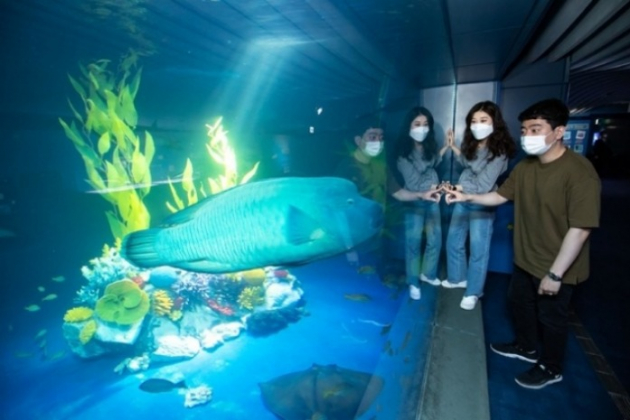Business & Politics
S.Korea's fisheries ministry to transfer tech on Napoleon fish to SE Asia
The nation will pursue 30 official development assistance projects in maritime affairs and fisheries in 20 countries
By Feb 01, 2023 (Gmt+09:00)
2
Min read
Most Read
LG Chem to sell water filter business to Glenwood PE for $692 million


Kyobo Life poised to buy Japan’s SBI Group-owned savings bank


KT&G eyes overseas M&A after rejecting activist fund's offer


StockX in merger talks with Naver’s online reseller Kream


Mirae Asset to be named Korea Post’s core real estate fund operator



South Korea's Ministry of Oceans and Fisheries will transfer technology to Indonesia on farming the tropical Napoleon fish and reduce sea pollution in the Philippines, the world's biggest producer of ocean plastic waste.
The ministry on Wednesday announced these projects in this year's plan for official development assistance (ODA), which covers 30 projects including 14 new ventures like generation of differences in seawater temperature and construction of specialized fishing villages.
Aid worth an estimated 28.7 billion won ($23.3 million) will go to 20 countries eligible for cooperation.
The ministry will pursue a smart base for aquaculture growth to solve food problems in desert and tropical regions where fisheries is difficult due to water shortages and high temperatures, as well as in countries highly dependent on fisheries but that lack this resource due to overfishing.
Others include the modernization of aquaculture facilities to automate water temperature control, feed supply and disease management, transfer of eco-friendly aquaculture technology, and R&D and human resource development as a package.
The ministry's leading project this year, however, raising the productivity of Yukyuma-Napoleon fish farming in Indonesia.
A large species that grows to over 100kg, the Napoleon fish is a new breed that adapts to changes in the marine environment such as rising sea temperatures and can breed in eco-friendly farms. Not just for ornamental purposes, the species fetches a high price as a popular food in the Greater China region.
Based on its success in 2016 of Biofloc shrimp farming in the Sahara Desert of southern Algeria, the ministry will develop Yukyuma and Napoleon fish, two high added value breeds that are farmable in Indonesian waters.
In cooperation with the intergovernmental organization Partnerships in Environmental Management for the Seas of East Asia, the ministry will also pursue lifecycle management of marine plastic in the Philippines, the world's biggest generator of marine waste, and Timor-Leste.
A plan will be devised to manage the region's marine plastic waste and support related facilities such as garbage blocking facilities, collection vehicles and pickup lots.
"Our nation, which aspires to become a world leader in maritime affairs and fisheries, is among countries that must fulfill their responsibilities to achieve the United Nations 2030 Sustainable Development Goals," said Minister of Oceans and Fisheries Cho Seung-hwan. "We will keep striving to expand ODA in maritime affairs and fisheries."
Write to Jung-hwan Hwang at jung@hankyung.com
More to Read
-
 AgTechS.Korea sends dairy cows, livestock genetic resources to Nepal
AgTechS.Korea sends dairy cows, livestock genetic resources to NepalDec 07, 2022 (Gmt+09:00)
1 Min read -
 Food & BeverageDrones, AI, big data power Korean fisheries’ earnings
Food & BeverageDrones, AI, big data power Korean fisheries’ earningsAug 17, 2022 (Gmt+09:00)
2 Min read
Comment 0
LOG IN


